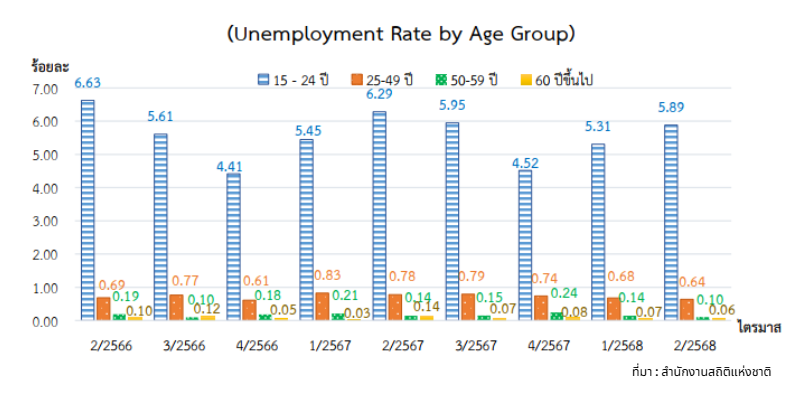
Graduate Employment in Thailand 2025: Overview, Trends, and Preparation
In 2025, the Thai labor market continues to face rapid changes driven by global economic factors, technological advancements, and evolving employment structures. The third quarter of this year marks a period when many companies begin adjusting their human resource strategies to align with business conditions and competition. At the same time, over 215,000 new graduates (projected from the class of 2024) entering the labor market are encountering opportunities and challenges that differ from previous generations. This article explores the overall employment landscape for 2025 graduates, diving into shifting employment trends and what organizations and young workers should prepare for to keep pace with these significant changes.
Graduate Employment Overview in 2025: Opportunities and Challenges
According to projections for 2025, approximately 215,000 new graduates with bachelor’s degrees will enter the Thai labor market. This sizable number reflects the continued attention companies give to “new graduates.” However, entering the labor market is no longer easy due to:
1.Increased competition – Graduates not only compete with peers but also with experienced workers seeking entry-level positions for stability or career changes.
2.Skill gaps – Many new graduates lack essential work-ready skills, particularly in digital literacy, data analytics, English proficiency, and communication and soft skills.
3.Adapting to new work styles – Hybrid and remote work remain key factors. Companies expect new graduates to be highly responsible and capable of self-management, even when not working full-time in the office.
Additionally, according to the Labor Economics Division, Ministry of Labor, the highest unemployment rate in Thailand is among those aged 15–24 (5.89%), which includes students and new graduates. This indicates that the supply of graduates exceeds the labor market demand or that there is a skill mismatch between academic training and market needs. New graduates are at the highest risk of unemployment due to a lack of real work experience, high competition among peers, and misalignment of academic disciplines with available positions.
Many companies seek work-ready skills, such as digital literacy, communication, and problem-solving. To address this, emphasis should be placed on real internships, upskilling/reskilling, and career guidance during university education. Thus, while new graduates face significant challenges, the right preparation can enhance their employability.

Opportunities for Graduates Despite the challenges, opportunities remain, especially in growing industries:
1.Digital Technology and AI – Roles in data, cybersecurity, and AI engineering are in high demand.
2.Logistics and E-commerce – Positions in supply chain, e-commerce operations, and digital marketing continue to expand.
3.Energy and Environment – Graduates with backgrounds in engineering, environmental science, or clean energy are increasingly sought after.
4.Healthcare and Well-being – Opportunities include medical personnel, nurses, nutritionists, and mental health service providers.
Graduates who are adaptable and possess in-demand skills will find ample opportunities in Thailand’s 2025 labor market.
Source : กองเศรษฐกิจการแรงงาน กระทรวงแรงงาน
Changing Employment Trends
1. Reduction in Hiring for Certain Full-time Positions
Many organizations have begun adjusting their strategies to cut costs and increase flexibility, especially in fields where automation and technology can step in to replace human labor. As a result, companies are slowing down the hiring of full-time employees in these areas and are shifting toward new forms of employment instead.
2. Growth in Part-time and Contract-based Employment
On the other hand, part-time and contract-based employment is gaining popularity, as it benefits both companies and workers, particularly in service industries, retail, e-commerce, and digital-related jobs. This type of employment continues to grow steadily.
From the company’s perspective: It lowers long-term employment costs, allows workforce adjustments based on workload, and enables access to specialists for key projects without permanent hires.
From the worker’s perspective: It offers diverse experiences, opportunities to explore different career paths, pay based on performance (sometimes higher than full-time roles), and greater flexibility.
The labor market reflects a growing emphasis on flexibility. Companies are no longer focused on lifelong employment but on hiring individuals who can create value when needed. Graduates and all workers must adapt to this new reality.
Key Considerations for Organizations
- Design hybrid and flexible employment models combining permanent, contract, and part-time work to adapt quickly to business needs.
- Strengthen employer branding, especially among graduates, to show that the company is open to learning, flexible, and attractive to top talent.
- Invest in HR technology to manage workforce flexibility effectively.
- Offer fair compensation and benefits, particularly for contract and part-time workers, to attract and retain skilled personnel.
- Support continuous skills development, through internal training or external online courses, ensuring employees remain market-ready.
Q3 2025 Outlook: A Turning Point for the Thai Labor Market
Thailand’s labor market in 2025 reflects the modern workplace’s rapidly evolving environment. The third quarter is expected to show resilience, with low unemployment (0.96%) and workforce growth, although at a slower pace.
However, opportunities and competition will intensify, particularly for graduates without distinct skills or work experience. Many companies may reduce permanent hiring in some sectors, opting for part-time or contract work, while seeking candidates with specialized skills. Graduates with a technology background and willingness to adapt to diverse work formats are likely to have better prospects than those waiting solely for permanent positions.
Ultimately, preparation for change is key. Both organizations and personnel must be ready to learn, adapt, and design strategies aligned with the real labor market.
Sources: Labor Economics Division, Ministry of Labor NESDC Komchadlued, JobsDB
Personnel Consultant , we’re Japanese recruitment agency company in Bangkok. We has been in the business of recruiting Thai and Japanese talent for 30 years. Companies looking for talent & staffing , please contact us through this form Click
Tel.02-2608454
Email : jobs@personnelconsultant.co.th
Contact & Follow Us












